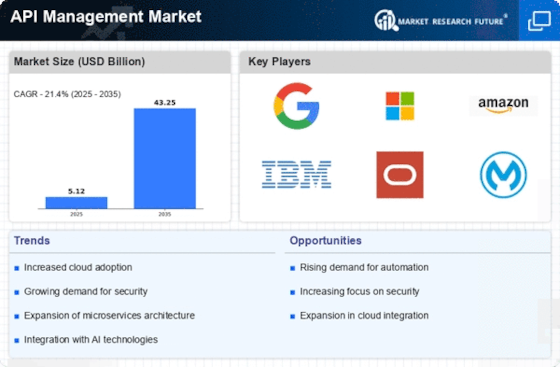Market Share
Introduction: Navigating the Competitive Landscape of API Management
The API management market is witnessing an unprecedented growth in competition, owing to the rapid technological developments, the changing regulatory frameworks and the increased demand for seamless digital experiences. Competition is growing as several players, including system builders, IT service and solution companies, and even the most advanced AI startups, are vying for leadership in the market. System builders are focused on delivering robust integration solutions, while IT systems integrators are promoting the benefits of a tailored approach to improving operational efficiency. Infrastructure providers are taking advantage of the cloud-native architectures, and the most advanced AI startups are introducing advanced analytics and automation tools that are redefining the metrics for API performance. These factors are creating a competitive landscape in which technology-driven differentiators, such as IoT integration, biometric security, and green data centers, are defining the vendor positioning and market share. Strategic deployment trends are also aligning with local regulatory requirements and consumer demands, which will create a dynamic landscape in the coming years.
Competitive Positioning
Full-Suite Integrators
These vendors offer comprehensive API management solutions that integrate seamlessly with broader enterprise systems.
| Vendor | Competitive Edge | Solution Focus | Regional Focus |
|---|---|---|---|
| IBM CORPORATION (U.S.) | Strong enterprise integration capabilities | API management and integration | Global |
| MICROSOFT CORPORATION (U.S.) | Robust cloud integration with Azure | Cloud-based API management | Global |
| ORACLE CORPORATION (U.S.) | Comprehensive enterprise solutions | API management and data integration | Global |
| SAP SE | Strong ERP integration | API management for enterprise applications | Global |
Specialized Technology Vendors
These vendors focus on niche API management solutions, often emphasizing specific functionalities or industries.
| Vendor | Competitive Edge | Solution Focus | Regional Focus |
|---|---|---|---|
| MULESOFT, INC. (U.S.) | Leading integration platform for APIs | API-led connectivity | Global |
| WSO2 | Open-source flexibility and customization | API management and integration | Global |
| AKANA, INC. (U.S.) | Focus on security and compliance | API security and management | North America |
| Axway | Strong focus on hybrid integration | API management and analytics | Global |
| Tibco software | Real-time data integration capabilities | API management and integration | Global |
Infrastructure & Equipment Providers
These vendors provide foundational technology and infrastructure that support API management solutions.
| Vendor | Competitive Edge | Solution Focus | Regional Focus |
|---|---|---|---|
| HEWLETT-PACKARD ENTERPRISES CO. (U.S.) | Strong hardware and software integration | Infrastructure for API management | Global |
| CLOUD ELEMENTS, INC. (U.S.) | Focus on API integration for cloud services | API integration platform | North America |
| Akamai Technologies | Leading CDN and security solutions | API security and performance | Global |
| REDHAT, INC. (U.S.) | Open-source enterprise solutions | API management and integration | Global |
| Mashape Inc. (U.S.) | Developer-friendly API marketplace | API marketplace and management | Global |
Emerging Players & Regional Champions
- Kong Inc., a U.S. company, provides an open-source API gateway and microservices management platform, and recently won a contract from a major financial institution to build an API security system, competing with the established vendors such as Apigee with a more flexible and cost-effective alternative.
- Tyk Technologies (UK): Specializes in open-source API management with a focus on developer experience, recently implemented solutions for several European startups, complementing larger players by offering tailored solutions for smaller enterprises.
- Postman (US): Known for its development and testing tools for the API, Postman has recently added the management of the API, and has a partnership with a major cloud provider to support the life cycle of the API. It is a platform that is challenging the traditional API management platform.
- WSO2 (Sri Lanka): Provides a comprehensive API management platform with strong integration capabilities, recently signed a digital transformation contract with an Asian government agency, and competes with large vendors by providing open-source and flexible solutions.
Regional Trends: In 2024, digital transformation initiatives in the Asia-Pacific and European regions will drive the significant increase in API management deployments. In particular, the move towards open-source, flexible solutions that can be tailored to individual requirements will continue to push away from the traditional, monolithic platforms. Also, security and compliance will continue to be the key drivers, especially in the regulated industries.
Collaborations & M&A Movements
- Google Cloud and Apigee announced a partnership to enhance API security and management capabilities, aiming to capture a larger share of the enterprise market amidst increasing regulatory scrutiny on data privacy.
- IBM acquired Red Hat's API management division in early 2024 to strengthen its hybrid cloud offerings and improve competitive positioning against AWS and Azure.
- MuleSoft and Salesforce entered into a collaboration to integrate their platforms more seamlessly, enhancing customer experience and driving adoption in the CRM sector.
Competitive Summary Table
| Capability | Leading Players | Remarks |
|---|---|---|
| Biometric Self-Boarding | Okta, Auth0 | The security and efficiency of the boarding process at several large airports have been improved by the implementation of Okta’s biometric boarding solutions. A number of airlines have adopted Okta’s biometrics for use in the check-in process. |
| AI-Powered Ops Mgmt | MuleSoft, IBM | AI optimizes the management of APIs and operational efficiency of the MuleSoft Anypoint Platform. Case studies show that the downtime of clients is reduced. IBM's Watson API Management tools use AI for forecasting and foreseeing problems. |
| Border Control | Thales, Gemalto | Biometric data, a great advantage of the Thales system, are used in conjunction with identity cards, which enables a considerable reduction in the time taken at the frontier. Similarly, the Gemalto systems, widely used throughout Europe, are based on a high level of security and real-time data analysis. |
| Sustainability | Microsoft, Google Cloud | Microsoft’s Azure API Management is designed to help businesses reduce their carbon footprint. And the company has published case studies that demonstrate successful carbon-reduction initiatives. Google Cloud’s APIs also support energy-efficient operations, promoting a culture of sustainable practices among its customers. |
| Passenger Experience | Salesforce, SAP | The Salesforce platform has improved the experience of passengers with a personal touch and a live feed. The result has been increased customer satisfaction. The solutions of SAP combine passenger data to optimize services and enhance the travel experience. |
Conclusion: Navigating the Competitive API Landscape
The API management market in 2024 is characterized by high competition and significant fragmentation. The competition between the leading companies and the newcomers is becoming more and more intense. The established vendors rely on their experience and established platforms, while the newcomers focus on new capabilities, such as AI-driven analytics and automation, to distinguish themselves. Also, regional trends are emerging that show an increased focus on flexibility and sustainability, as organizations increasingly seek solutions that meet their environmental goals and can be adapted to changing market requirements. For the vendors, the ability to integrate new technology into their offerings and offer scalable and easy-to-use solutions will be decisive for market leadership. The decision-makers will be forced to focus on establishing new business relationships and investments to enhance their own API management capabilities and remain agile and competitive in the constantly changing environment.



















Leave a Comment